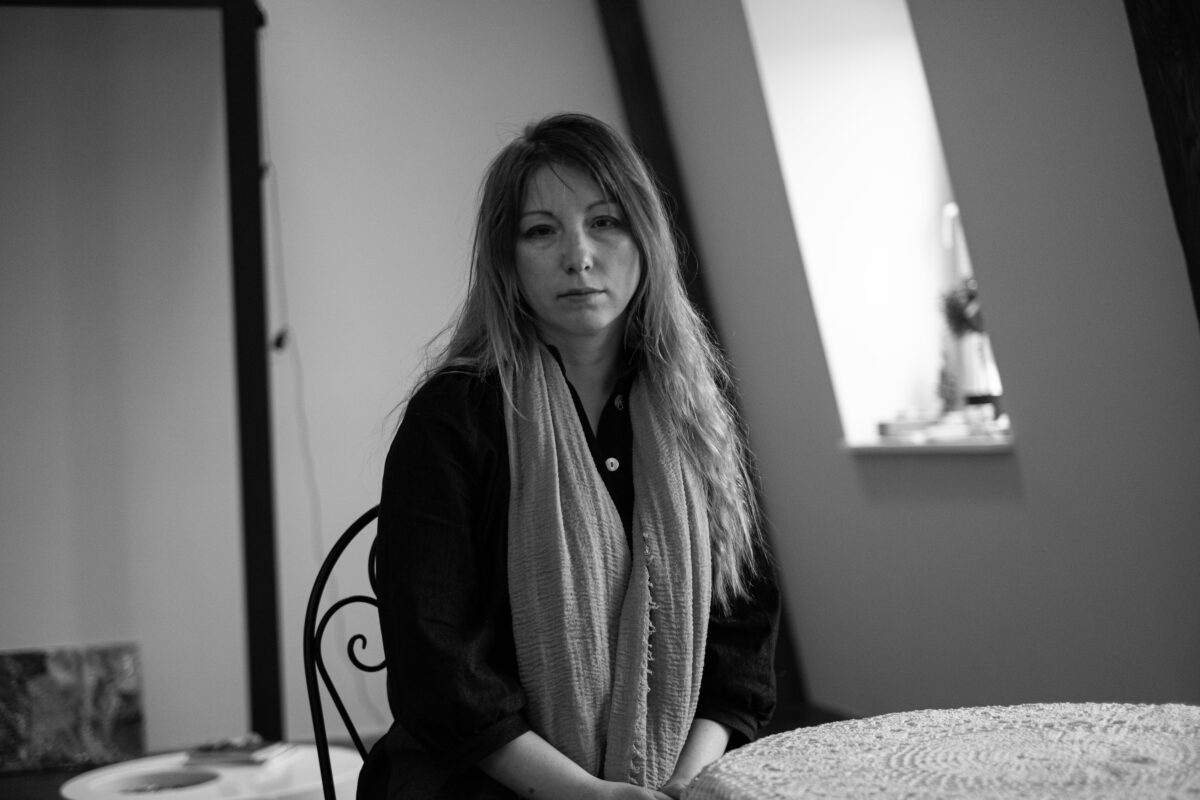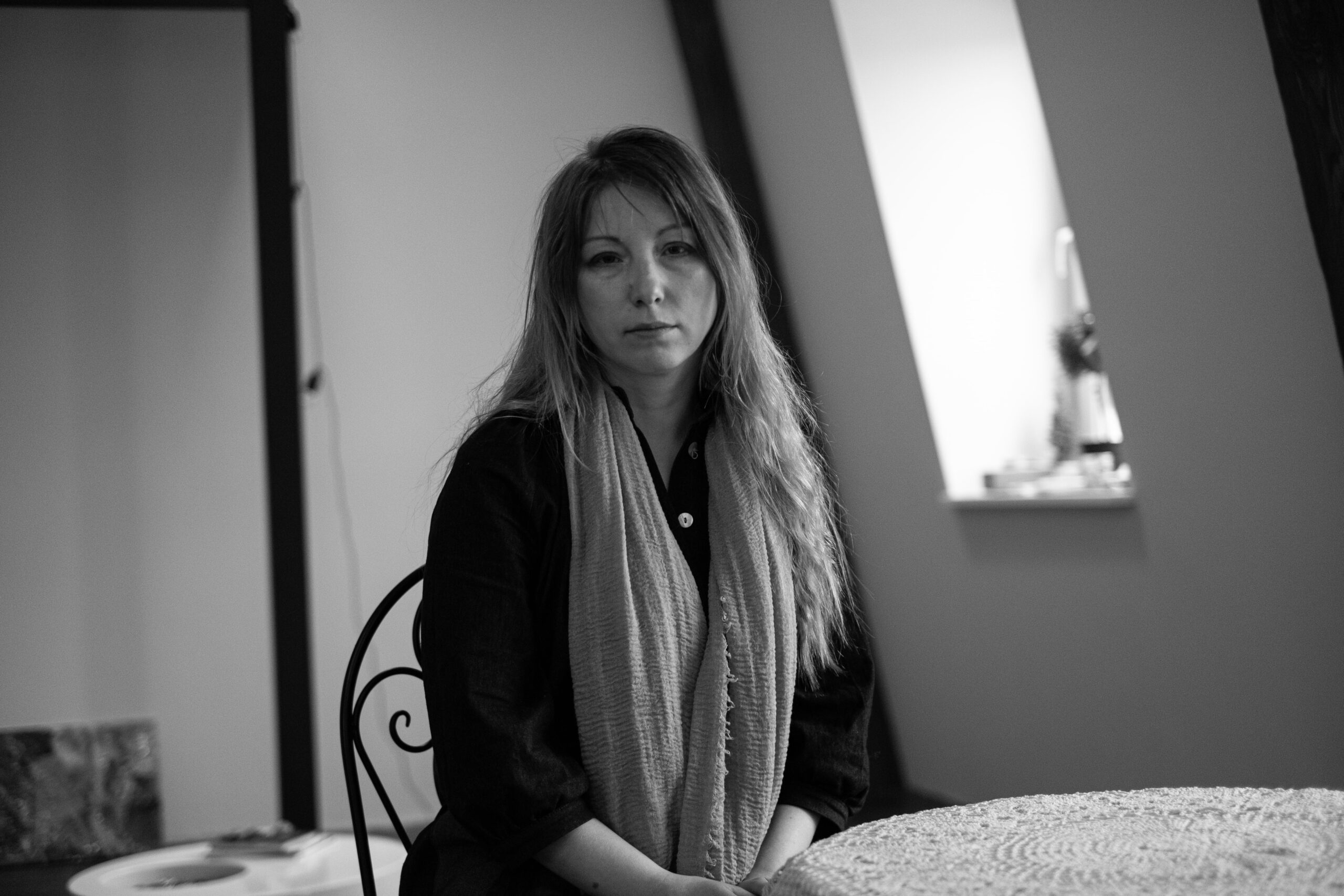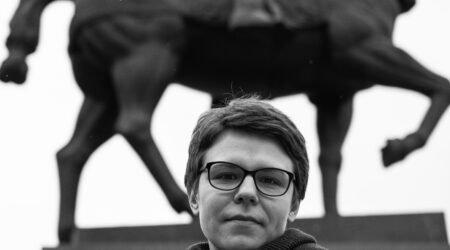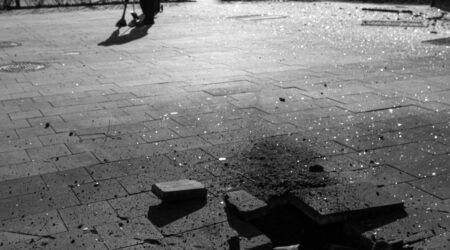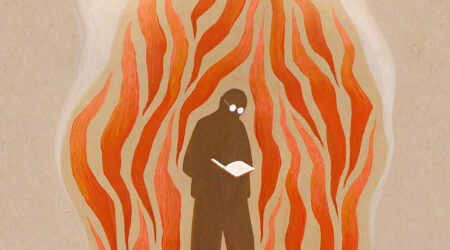Victoria Amelia was wounded in a Russian missile attack in Kramatorsk in eastern Ukraine on 27 June, 2023, and died, aged 37, of her injuries four days later. The strike, which deliberately targeted a civilian center, injured 61 people and killed 13, including 14-year-old twin sisters. The head of the Duma Defense Committee, Colonel General Andrey Kartapolo, described the strike as “a real beauty,” adding, “My old military heart rejoices.”
At the time of her death, Amelina had been working with the Ukrainian human rights group, Truth Hounds, and was with a small group of Columbian journalists at a popular pizza restaurant when the attack took place. It was a few months after she had earned that she had been awarded a residential fellowship at Columbia University’s Institute for Ideas and Imagination. It meant she would get to spend a year in Paris, with her husband and her young son. She planned to write a book. We will never get to read that book, or any others that were gestating in her brilliant mind.
At Brookline’s Booksmith on Saturday 30 September, 2023, friends gathered to celebrate the writer’s legacy. In honor of Victoria, we’re publishing the original conversation with Victoria, undertaken for our feature, A Little Sun, A Litte Rain, which ran in Grand Journal issue no. 4, in the fall of 2022.
I met Victoria Amelina on an unexpectedly mild day in late March 2022, barely a month into the war, at a bookstore on Halytska Street in Lviv. It was the same weekend that Joe Biden was in Warsaw to show solidarity with Ukraine and its neighbors, then dealing with tens of thousands of war refugees. Vladimir Putin chose to respond by shelling Lviv. You could see thick plumes smoke rising from the suburbs where a missile attack had struck a fuel depot, injuring five people. But in the city center, life felt more or less normal, albeit swollen by tens of thousands of displaced people who had traveled from the east. The cafes were open and bustling, there were ice cream sellers on the streets, a small outdoor market where you could peruse used books. In the bookstore, Victoria was sitting at a small table with a coffee. She smiled in welcome, but was otherwise pensive through our conversation, clearly processing the traumatic ramifications of the war.
Our conversation began with her recollection of February 24, the morning that Russian tanks poured over the border. She was in Egypt, vacationing on the Red Sea in Sharm el Sheikh, and recalled waking to read about the invasion on social media, the invasion few had believed would actually happen, before traveling to the airport to board her flight. But there were no flights to Kiev, of course, and after much confusion she and her son were put on a flight to Prague. Back in the EU, she understood that for her, as for most Ukrainians, the question of identity was forever settled. “The border officer, a young woman, didn’t ask anything, she just looked at us with real compassion and stamped our passports,” Victoria recalled. “This is when I started crying… I realized, I’m home, because Europe is my home.”
Victoria was born in 1986, the year of the Chernobyl catastrophe—the year that the USSR began to disintegrate. “My parents were told it was safe by the Soviet government, and my mum recalls walking with me in a stroller as the radioactive clouds gathered over Lviv,” she told me. Like many Ukrainian families, her history was complicated. Her grandfather had been a colonel in the Soviet army, and a military pilot. “He was a divided inside because he was from the part of Ukraine that suffered the most from Holodomor [the genocide by Stalin’s artificially-induced famine]; his only choice was to go to pilot school or stay in the village,” Victoria explained. “The peasants in the Soviet Union couldn’t leave their villages—they were prisoners there. He moved to Lviv, and during the independence years, Lviv was a pioneer in the national revival, but still it was very difficult for my grandfather because he was in the Soviet military all his life—and of course he remembered the truth, so he wanted his children to be safe.”
Although her grandfather spoke Ukrainian, he made sure that Victoria’s mother and her sisters spoke Russian. That was how you insulated yourselves against stigma, aggression, exclusion.
“This is how Russification actually happened, because parents believed it was safer for their children not to suffer as they had. They took our language violently from us. I’ve had to reclaim my Ukrainian language—it would be easier for me to write in Russian; I have a very big library at home, Russian books that my grandmother gathered. All the classics. You can come to my apartment to see them, right now. The guests—we don’t like to call them refugees—girls from Kiev and their kids, live there, and you are invited to come and see.”
To my regret, I never made it to Victoria’s apartment. There were other conversations to have, other apartments to visit. I spent my time living with Ukrainian aid workers on the outskirts of the city, men who woke early, and spent their days at the Lviv train station unloading supplies, helping route refugees to Poland and Germany.
Victoria and I talked about the sight of Ukrainians streaming into Lviv, or across the border into Poland, with their cats and dogs, a familiar trope in news photos. “Some people have a choice,” she said. “You can either take a cat or more luggage, but people choose to take their cats. I have a dog, a white shepherd, Lyra, and I spent two days getting my eight-year-old niece, Maria, and my dog and my mom to Poland. So my mum and my niece and my dog are now safe in Poland; we were at the border for about 19 hours. I now know I can drive without sleeping. My mom would say, “drive,” and I would wake and drive a little bit more so no-one would line-jump ahead of me.
Victoria had won a literary prize in Poland, just a few months before the war, and it helped cover the apartment in Krakow where her mother and son were staying. “I need to be here [in Lviv],” said Victoria. “I can volunteer, I can help to establish relations between Americans and Canadians who want to send aid here—its important because we don’t just need any help, we need for instance, tourniquets, blood-clotting medicine.”
We talked about a literary festival Victoria had founded in 2021 in a small down in Donetsk called New York, an act of defiance and resistance. “It was called New York by German colonists who arrived in the 19th century. It was an El Dorado for them, and it was a really beautiful town with a bookstore, a hotel, a lot of restaurants, it was a really great example of wonderful cohabitation of Ukrainians, Germans and other Europeans. After the Bolshevik victory in 1917 Russians executed the owners of the bookstore, and deported many of the remaining colonists. The hotel closed. The town was renamed Novhorodske in 1951.”
Ukraine had recently reinstated the town’s original name of New York. “Of course Russian television tells everyone this is Americanization,” said Victoria. “This is not Americanization, this is just getting our European history back.”
Will she still read her books in Russian, I asked? She responded, with scorn. “I can now read Dickens in English, why would I read him in Russian?”
There is no mystery to the Russian soul; they want to suffer, they thrive on it, and they want us to suffer.
How about Doestevski? Is it complicated now?
“No, it’s not a complicated experience, I just understand that this mysterious Russian soul is not so mysterious. There is a poem by Fyodor Tyutchev. He writes that Russia is a land of long suffering, he actually glorifies the long suffering. All their books are about how they have this mission to save the world and they are those long-suffering people. I finally realized: Russians just want Ukraine to be part of their long suffering. It’s a psychosis. There is no mystery to the Russian soul; they want to suffer, they thrive on it, and they want us to suffer.
“The most important thing to understand is that they stole our name. Russe originated in Kiev, and it’s their story that somehow Russe moved from Kiev to Moscow. It didn’t. Moscow is the legacy of Genghis Khan. It doesn’t really matter to us, because they are really obsessed with history, with thousand-year old history, but the churches, the temples of Kiev and Russe are still in Kiev, and this is why they are so obsessed with Kiev.
“I was heavily influenced by Russian propaganda, and in the ’90s, although Ukraine was independent, our family kept watching Russian TV channels, and I thought Chechnya was doing something wrong, not that Russia was killing Chechens so propaganda worked for me. I was a kid and I thought that Russians are doing the right thing, that they are saving Chechnya, like they are saving me now—thank you so much, I don’t need to be saved.”
Victoria won a contest at school at the age of 15, and was sent to Moscow for a Russian language and literature contest. “The reporters from Russian TV were looking for someone from Lviv because they always try to portray my city as a nationalist center, and so they came to me and their question was, ‘Please tell us how they don’t let you speak Russian in Lviv?’ And I said, ‘What, who doesn’t let me speak Russian in Lviv? That’s all bullshit.’ It was definitely not what they wanted to hear.”
This was a crystalizing moment for Victoria. “It was one of the moments when I realized how different we are, and that we are not friends—they were looking to use me to present Lviv as an intolerant place.”
The piece that Victoria wrote was “a poem about war, about how we can go to sleep and say goodnight, while people in Grozny or Kabul have to be afraid for their lives.” She won second place. First place went to a boy from Latvia. “He was reading a poem about how Russian language is endangered.” At this she offered a wry smile.
I understand how this must be painful for those Russians who do not agree with what Putin has launched in their name, but it’s not Putin, personally, who rapes and kills on the outskirts of Kiev.
“It’s not that we are drawn to European values, we don’t have the choice—we are part of Europe. We don’t have this dilemma that Russians have—are we part of Europe or part of Asia. No, we’re part of Europe, it’s so obvious for us. What they punish us for is that we always resolve our suffering. We go to Maidan, we protest. This is how Ukrainians are, because our freedom is more important to us. Russians cannot forgive us that. They are used to being obedient to czars, to tyrants. I understand how this must be painful for those Russians who do not agree with what Putin has launched in their name, but it’s not Putin, personally, who rapes and kills on the outskirts of Kiev.”
Shortly before I’d left a Russian journalist, Marina Ovsyannikova, had stood up on Russian TV with a sign protesting the war. I’d been moved by it. Victoria did not share my enthusiasm.
“For a few seconds she holds this sign and now she’s a member of PEN Austria, she’s a hero. We’re not heroes here, but she is a hero, although for years she worked for a channel that created fake reports that enabled this war, and now she’s bought a ticket for herself to escape. Meanwhile journalists in this country are being killed, and these are real journalists, not journalists who make fake stories, and cooperate with government propaganda.”
Was she still writing, I wanted to know? “It is really difficult to write; I don’t write poems. I try to write novels and essays, and for that you have to think clearly and have some distance, so I don’t write and I don’t have time to write. There is always this dilemma of whether to interfere, or to take a picture—as Susan Sontag writes about in her famous essay on photography. My choice, so far, is to interfere, because I remember the photographer Kevin Carter [who took his life after photographing a starving child in Sudan].
“Writers are in a better position than photographers—they don’t have a choice. Photographers can either take a picture of someone being killed, or save them. Writers can do both, we can look now and write later.
We spoke at a moment when it seemed that Russia might pull back or reconfigure it’s aims. Did she feel that Russia was on the retreat? “I believe that Russian government has its own reality—obviously they are not getting truthful reports about what is happening, so we shouldn’t look for logical decisions, but they are like a wounded animal, and this wounded animal can try to bite us as painfully as possible. This is why I think the bombed Mariupol because they cannot take it, this is why they bombed Kharkhiv and its historical buildings, because they cannot take it, and this is why they would bomb Lviv, because they hate Lviv. I love this city, and it all looks very fragile to me right now.
Is it possible for a writer to be apolitical? “It’s immoral to be apolitical. This is what, unfortunately, the majority of Russians do not understand. We show them pictures of destroyed Mariupol or dead kids in Kharkiv or Kiev, many would say they are apolitical, they have nothing to do with politics, but this is not politics, this is people being killed, and we have to be involved. It’s not about writing, it’s about being human, and if you’re not human you can’t write books.”
We talked about her great influence as a child, the poet Paul Celan, born in Chernivtsi (thenCernăuți in Romania), the site of the first Yiddish language conference in 1908, and where more than a quarter of the population was Jewish in 1930. “Of course his writing is so full of pain, for some reason it helps me to relieve what I’m feeling right now—because he experienced such tragedy; his parents were killed in the Holocaust, he was a survivor.
“Of course, I didn’t have translations of Celan in my library from Soviet times, because the word Holocaust was forbidden in the Soviet Union, and if anyone tried to say that Jewish people specifically suffered during the war, the response would be, ‘No, Soviet citizens suffered.’ (In her novel about Lviv, the characters live in an apartment where another world-famous writer grew up, Stanislaw Lem, one of the few who survived the Holocaust in Lviv; deported by the Soviet Union to Poland, and never returned—he lived through three occupations in Lviv, the first Soviet occupation in 1939, the Nazi occupation in 1941, and then again the Soviet occupation).
“I lived in Boston in 2019 and 2020; I had a seven-year L visa. Someone asked me what home is, and I really feel at home in Boston, it’s a city of so many institutions like Harvard and MIT. I don’t have to explain myself to people—the values are my values, but I need to be in Ukraine, because I can change something here—home is what you build. We all now dream that we can go aback and build a new Mariupol, help to rebuild Kharkiv, so this is home.
“My son is now in Poland but he’s doing online classes with his school in Lviv, and we all really want to stay here. If we don’t stand here, in Ukraine, then I’m afraid that this darkness that comes from the east will just spread.” She finds herself telling her mother that she has to be ready to flee. If chemical weapons are used in Ukraine, people in Krakow will have to leave.
Will that happen? “No-one knows; we don’t know what’s in the head of Putin and his generals.”
Would she fight? “I’m not sure I would be a good fighter but I would love to fight.”
Would she make Molotov cocktails. “Right now, we don’t throw away any bottles just in case.
What is the role of the writer in Ukraine? “A writer is a mirror, you have to be a good mirror, you have to let people relive the events they won’t even remember clearly. I talked to my friends who escaped Bucha, and spent two weeks in the cellar with their kids, and when they ran out of Bucha they saw such terrible things that they arrived in Lviv, and could only say they remembered seeing something but were unable to say exactly what they saw, their memories were blocked.”
Victoria told me this before the world discovered the true horrors of Bucha, and months before it turned out that dozens of townspeople had been murdered by fléchettes—tiny metal darts, almost like nails. One afternoon I became obsessed with the story of a man who had cycled down the street and been killed at an intersection by a tank. His body lay there for weeks, mangled like his bike nearby. I wanted to know what compelled him to head out that day, and why a tank commander had decided this man on a bike was fair game. And then I multiplied the man and his bike by all the tragic and pointless deaths. How is it possible that someone can be there one minute, and not the next? This was happening all over Ukraine, while politicians in the West argued about how much support to provide.
“Right now, I try not to read too much news,” said Victoria. “If someone tells me, ‘there’s an image of this little kid who was killed,’ I can’t allow myself to be paralyzed by that, because right now I need to be helpful with humanitarian aid, and with refugees, but after the war I will have to understand the depth of pain that we have and probably to write about it in a way that lets us live because this is how we get revenge—we live. They want Ukraine to cease. This is how it is with New York in Donestk—they want us to forget our European history, and that’s why they remained it from New York to Novhorodske, and this is exactly why we renamed it back, because if they enemy wants you to forget something—this is exactly what you need to remember.”
This is a test for us, and I think we will learn again to live and to be happy.
“Right now it is emotionally easier to be in the warehouse with the humanitarian aid. I own a couple of apartments in Lviv, but I sleep on the floor. My guests have the beds, but even when I have a chance to sleep on the sofa, I choose to sleep in a sleeping bag on the floor.” She laughed. “I should talk to my therapist about it, but right now it is really easier for me to sleep on the floor like kids do right now in Kharkiv and Mariupol. This is a test for us, and I think we will learn again to live and to be happy.”
“In the Czech Republic, I saw my friend post about a performance for kids of the refugees—and this made me smile, because those kids are safe, and they can go to a show, and this will save me as well, because I not only write novels, I write children’s book. By the way, I met kids from Chernihiv, which is in a very bad situation right now. And I promised to go from Chernihiv and write a book about them, so I now have a mission, because a little girl was crying—she was crying because of a loud sound. She is three, and her brother is four, and they told me they loved to go to the cinema in Chernihiv, and the adults were telling me there was no more cinema; so I said, ‘OK kids, we have to invent a new name for the new wonderful cinema in Chernihiv, and we decided to name it with children’s names, with their names. And this is maybe what will save us—”
Recently, a shopping mall in Kiev had been shelled and burned to the ground. One of Victoria’s friends who lived next to the mall finally agreed to go to Lviv—”I found her a car and I made her memorize my address in Lviv, because I was afraid her phone would die on the way, and at 5.30 in the morning she knocked on my door. And when the morning came, and the curfew was over, and there were cars on the street, she was scared because of all the normal life on the street—she has found therapy with a cat that gives her comfort.”
As for the transformation of Zelensky, who had been urged by to flee Kiev at the beginning of the war, she was no less impressed than anyone else. When she was heading back to Ukraine through Poland on her return from Egypt, she stopped to buy flashlights and batteries. It was the second day of the war. “You have such a great president,” the shop assistant told her. She hadn’t heard Zelensky’s speeches at that point. She still thought of him as the naïve and divisive leader. “This is a wonderful transformation,” she says. “As a writer this is what you want to have in your novel—a character who is weak I the beginning and finds his roar, as they put it on the cover of The Economist.”

